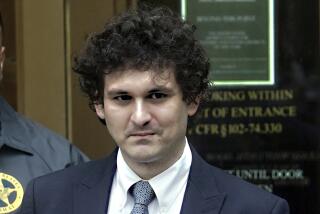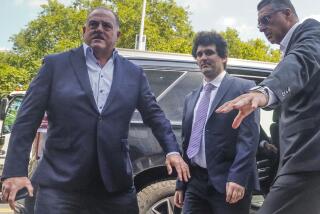Minkow Tells of Mob Control of Stocks
- Share via
When the ZZZZ Best carpet cleaning company hit Wall Street, the firm was in debt for $7 million and was in the control of mobsters, Barry Minkow testified Tuesday at his securities fraud trial.
Minkow said that a growing cadre of organized crime figures who claimed connections to the Genovese and Colombo crime families dictated his every move in 1986 as he prepared a $15-million stock offering.
Minkow is charged with 57 counts of securities, credit card and mail fraud. Ten other defendants have pleaded guilty. Accountant Norman Rothberg is on trial with Minkow charged with taking a bribe to hide ZZZZ Best’s frauds.
There were constant threats of death, Minkow claimed, and “I seemed to get progressively more threats the more stakes there were.”
The 22-year-old Minkow, who started his carpet cleaning firm at 16 in his parents garage, said he was conducting “a road show” to sell investors on the financial wonders of ZZZZ Best while the business was actually a fraud.
“It was important to puff up our income,” he said. “We were in the pricing stage of the public offering.”
To do this, he said, he took a total of $7 million in loans from First Interstate Bank, Union Bank, Bank Hapoalim and others, and he opened five branch offices.
“The offices were so we could show that we were the great ‘7-Eleven’ of carpet cleaning,” he said, referring to the chain of convenience stores.
“It was just so I could say to the Wall Street bankers, ‘We’re wonderful. Buy our stock,’ ” he testified. “And we were nothing. We were losing money.”
One time he said he bribed a bank officer with $25,000 to get a $1-million loan. The officer was not identified.
More Loans
As plans for the public offering of ZZZZ Best progressed, Minkow said he was forced to take more loans, some made to fictitious companies that then paid the money to ZZZZ Best to show the carpet cleaning firm had income.
“Income creation, that was the key,” Minkow said. “Income moves stock prices. It has to do with income per share or something, I don’t know.”
Minkow, seeking to deflate a prosecution claim that he was a skilled con man, is presenting a defense of duress, portraying himself as a boy in the clutches of the mob.
Once, Minkow said, a mobster held his head under water and another time he was kicked in the testicles for resisting the loan scam.
One incident of brutality, he said, came because he had developed a friendship with an investor, Peter Strauss, and wanted to pay back a loan to Strauss.
“They said, ‘Your affections for Peter Strauss are getting in the way of business,’ ” Minkow said. “They said, ‘Your devotion and loyalty are to us.’ ”
Defense attorney David Kenner repeatedly asked Minkow why he did not go to police or try to escape. Minkow said he was scared.
“I just felt there was nowhere to go anymore,” he said.
More to Read
Inside the business of entertainment
The Wide Shot brings you news, analysis and insights on everything from streaming wars to production — and what it all means for the future.
You may occasionally receive promotional content from the Los Angeles Times.










